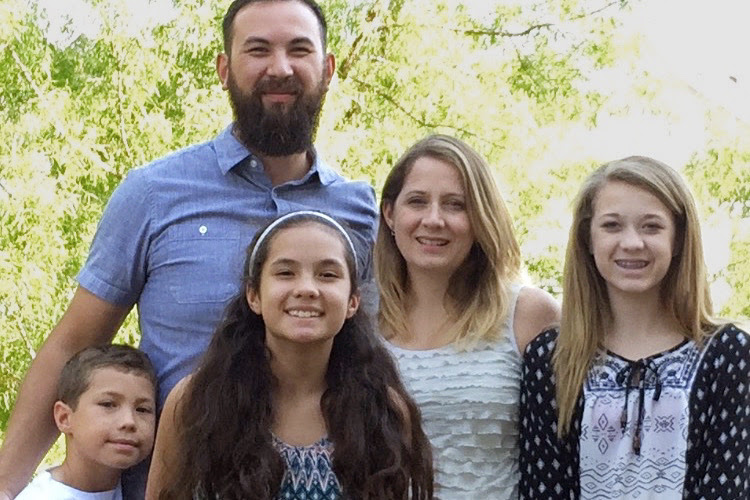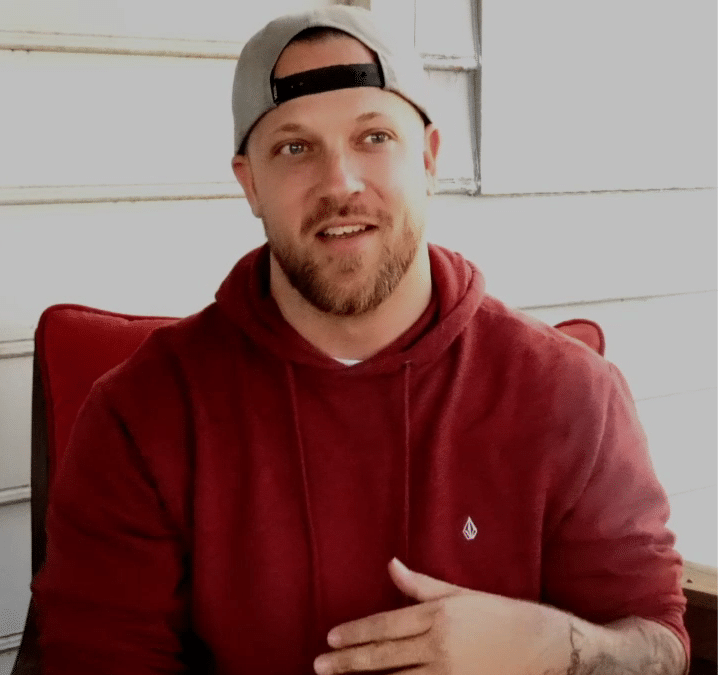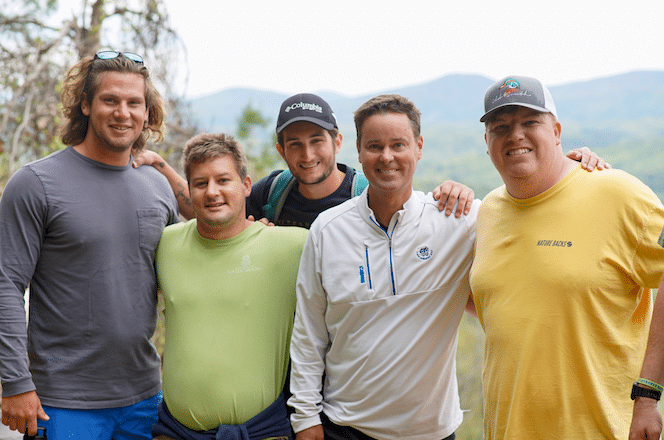
by Nolongerbound | Dec 9, 2021 | Faith-Based Recovery
In Brandon Rayburn’s final month at No Longer Bound, he felt like a changed man.
He was ready to make up for lost time but knew he couldn’t go back to his former job (which was tied to his addiction), so he became a coporate VP employing other recovering addicts instead.
“I had a wife and three small children. We had lost our house through the process of my addiction. We literally had nothing and were starting over from square one.”
A man named Vince (also an NLB alumnus) walked onto campus one day and handed Brandon a piece of paper.
“I hear you need a job,” he said. “Show up at this address and we’ll hire you.”
That’s how Brandon Rayburn began working for Special T, the nation’s largest table-only manufacturer. And it’s how eventually, he became a Corporate VP employing other recovering addicts
At the time, it was located just around the corner from No Longer Bound’s campus.
At first, Brandon worked in the warehouse, packing tabletops into boxes. The pay covered only the cost of his children’s after-school daycare, but it was a start.
“I didn’t know what I was saying yes to,” said Brandon. “Looking back, it was God. Special T has pushed me, believed in me, and lifted me up in ways I could never have done myself.”

Brandon enjoying a ballgame with his wife and son.
In the past ten years, Brandon promoted through almost every job in the company. From the warehouse, he moved to ordering, then shipping. Today he is the Vice President of Operations.
In that ten years, Special T has grown from 10 million to 21 million dollars in sales. But more significantly, it has achieved this success by hiring people in recovery and creating a workplace culture that allows men and women in early recovery a chance to start over and change their lives.
As a Corporate VP employing other recovering addicts, Brandon has hired more than 70 No Longer Bound graduates in the past ten years.
“Probably over a hundred men in recovery total,” he said. “In the beginning, our environment was men in recovery helping out other men. Then we hired a new employee who adopted the title Recovery Director.”
The Recovery Director leads early morning recovery meetings daily, manages the workplace sponsorship program, and crafts contracts with new employees related to their sobriety.
“We haven’t experienced any of the labor issues the rest of the country seems to be facing,” said Brandon. “There seems to be an abundance of men and women in recovery in need of a job.”
Brandon said being a part of a recovery community at work not only helps him feel whole emotionally, but it also helps him do what No Longer Bound taught him to do.
“No Longer Bound told us we need to disciple others, give back to the community and help new people.”
What’s next for Brandon, as a corporate VP employing other recovering addicts?
“A rise in addiction indicators has already been announced—increased spousal abuse, increased child abuse, social isolation. These things are gasoline to addiction. It’s going to be an exponential problem. What do we do with that? How do we work together? How do we get a bigger soapbox?”
Brandon said the hardest and most rewarding event of his life was going through No Longer Bound.
“I found out who I was and who I wasn’t there. I learned that I’m not my vocation. I’m Brandon the father. I’m Brandon the son. And I’m Brandon the husband. What I do for a living gives me value, but it doesn’t define me. Now I have joy and peace in doing anything.”

by Nolongerbound | Dec 3, 2021 | Faith-Based Recovery, Vlog
Adam Miller Calls It A Game Changer In His Battle Against Addiction
Once he started expressing painful emotions in his journal, Adam started hearing the voice of God. Now on the counseling staff as an Aftercare Specialist at No Longer Bound, Adam explains in the short video above.

by Nolongerbound | May 22, 2021 | self improvement
Written By: A No Longer Bound Resident, Austin
“Codependent” was once used to describe a specific set of behaviors in spouses of alcoholics. While this is still true, the term has expanded to other situations. It also includes people who have grown up in a dysfunctional home and other difficult circumstances.
As a faith-based addiction program, we define “codependence” as a relationship in which one partner finds his or her worth or identity based on a relationship with someone else.
The codependent person often chooses relationships in which the other person needs to be rescued. Whether knowingly or not, they take on this role because they want to be indispensable.
Although at first glance this concept seems to be based on outward relationships, codependency is actually a dysfunctional relationship within the self. It is a pathological or addictive relationship with other people. These unhealthy relationships tend to be primarily one-sided (as opposed to a healthy, mutually satisfying relationship).
Perils of Codependent Relationships: How Does Codependency Play Out in Addiction?
One doctor paints the picture of codependency within addiction like this: “The addicted person develops a relationship whereby the other person will feed into the addiction. So the wife or husband or other family member almost facilitates the person’s ongoing dependence on the substance. That’s not because they’re intending to make it worse, it’s because they’re drawn into that whole circle of behavior, and breaking the pattern of that is almost impossible.”
Generally, a codependent person’s attitude is very easily affected by others. Typically, a codependent person reacts, under-reacts, or overreacts to problems and stress. Rarely do they just act.
Codependents have a tendency to overreact to things that aren’t that big of a deal, while they under-react to situations that actually are important. Both of these reactions represent a different aspect of codependency.
An overreaction is addictive because the codependent party is able to:
- help others in crisis/be the rescuer
- fix problems
- focus on the negative things others do to them
- blame those around them for their own issues
All of these are behaviors are used to avoid their own reality and pain.
An under-reaction is the denial side of codependency. Denial behaviors actually refuse people of their basic human needs. This forces the person to minimize or eliminate feelings, pain, ambitions, goals, and more.
Perils of Codependent Relationships: Our Basic Needs as Humans
At No Longer Bound, we teach that a person’s basic needs are love, acceptance, worth, and security (LAWS). Almost always, a codependent’s basic needs are restricted or falsely met within a dysfunctional relationship.
Unfortunately, codependency can lead to a false sense of worth or responsibility, as well as hurt and anger. Codependency may have developed in one’s childhood as a need to fix others’ problems. It’s likely that they were in situations where they needed to rescue or control someone. It’s also likely that their basic needs were not being met at that time.
Are You In A Codependent Relationship?
Left unchecked, codependency can become a response to people in all of their relationships, although it usually begins in only a few. Many (not all) relationships that involve active addiction, neglect, abuse, or control are defined as codependent.
If a person feels that they are responsible for trying to make the other person happy, they might be a codependent. Here are some other clues that your relationship is codependent:
- You have an obsessive need to please the other person
- You feel guilty if you don’t do everything correctly
- You worry about minor mistakes that could upset them
- You feel incomplete without the presence of another individual
- You neglect self-care
- You have resentment towards your role as the rescuer
- You lack objectivity when helping others
- You take yourself and situations too seriously
In short, codependents seek others for their own validation and happiness, resulting in completely dismissing their personal responsibility.
Changing a codependent relationship starts by setting healthy boundaries and having a healthy understanding of the role you play. For men in addiction, a faith-based addiction program like No Longer Bound can help you set these boundaries and work toward reconciling codependent relationships.
-Austin

by Nolongerbound | May 17, 2021 | Faith-Based Recovery
Recently, Edward Bailey, our Executive Director, shared a new perspective on manhood with the residents of No Longer Bound – a faith-based addiction treatment center. This is one resident’s key takeaways from that discussion.
Redefining Manhood: What Is A Man, Anyway?
When you think about what we have been taught about manhood, a few things may cross your mind. For example, fathers teach their sons that boys don’t cry, or men must provide for the family without allowing anyone to see him struggle. According to this definition of manhood, men certainly don’t ask for help, and they definitely don’t have any intimate relationships.
Maybe your definition of manhood comes from a famous movie where a man demonstrates that emotions are for girls, and men simply “don’t have them”.
Perhaps you believe that as long as you have all the money, the latest car in the garage, the biggest house on the block, and “manly” friends, then you’ve got it made.
Regardless of how your beliefs formed, most men define manhood in just a few short phrases:
- Be brave
- Take risks
- Work hard
- Be cool
- Get rich
But what if that was all wrong? What if we took these simple concepts and added to them, completely changing the way we think about them, effectively redefining manhood?
Here’s a fresh way to think about what it means to be a man.
Redefining Manhood: Be Brave with Your Emotions
As a man, of course you want to be brave, but you can be brave about the wrong things. What if you change what you’re brave about?
As a man, be brave with your emotions. Allow yourself to feel. Honor your feelings, name them, and don’t allow certain emotions to have the power to control your life.
Take a Risk To Be Rejected
Most men like to take risks. Some can be dangerous or damaging, but taking risks in a new way can pay off. Considering taking a risk that could lead to rejection. Sounds intimidating, right?
You must be accepting of the fact that some people may reject you and your decisions. The sense of belonging is comfortable, but when that is threatened, it can lead to fear regarding our social standing.
Rejection hurts because it threatens our entire identity, which is exactly what makes it so freeing when you make it to the other side. Once you shed yourself of people who hold you back and judge you, gone are the days of being stuck within the boundaries that are set by “the wrong crowd.”
Redefining Manhood: Work Hard On Yourself
Working hard is also a “manly trait” that fits most people’s definition of manhood. Although working hard at a job or relationship is extremely important, working hard on yourself is, too.
Do you know what’s manly? Taking the time to know yourself. Knowing what makes you tick and why, as well as knowing and setting goals for yourself to work towards. This is one of the most responsible choices someone can make for themselves.
The ancient thought of real men not asking for help is truly for the birds. Don’t be afraid to speak up, and ask for all of the help you need. Everyone can benefit from therapy because learning more about yourself is a blessing to everyone around you.
Whether the help is found within a faith-based program, or from a therapist of your own choosing, seeking help and talking with someone outside of yourself has endless benefits.
Be Cool To The Right Tribe
There is just something cool about being, well, cool. And deep down every man wants to be cool in their own way. However, being cool with the wrong people can be life-threatening. That’s why it’s important to find the right tribe.
Redefine cool, and find other people that have been rejected by taking their own risks. These are the people that will appreciate love, belonging, and the safety that comes from being rejected. They have experienced pain by people who don’t know what cool really is.
Get Rich in Love for Others
One of the most common stereotypes about manhood is wealth. For many, getting rich is important. But pursuing financial wealth is not what Jesus wants from us. In fact, he says that getting rich is a foolish goal. As Paul tells us, “For we brought nothing into the world, and we can take nothing out of it.” 1 Timothy 6:7.
That’s why this new definition of manhood encourages you to get rich by loving and caring for others. The act of caring for others may not always bring about financial worth, but it will give you personal wealth.
Jesus’ second commandment is to love others as you love yourself. But of course, to do this, you have to start by wholly loving yourself. Self-love is an ongoing process, and by redefining manhood, you are taking a great first step.
Learn more about our faith-based addiction treatment program.

by Nolongerbound | May 10, 2021 | Faith-Based Recovery
“He knows the way I take, When He has tried me, I shall come out as Gold.” (Job 23:10)
Written By: A No Longer Bound Resident, Austin
For men in a faith-based recovery program, the first step we’re encouraged to take when we’re disappointed in God is to be honest with Him. We’re told to open about our disappointments, and allow honest and open communication.
Even his most trusted followers, the earliest apostles – the ones that saw firsthand the miracles performed at the hand of Jesus – were disappointed and failed to fully trust Him. At times, they even failed to believe that God is all-knowing.
God knows your thoughts, heart, and ambitions. If you are disappointed, share with Him which expectations He has not met.
Did He not give you an answer in a timely manner? Maybe you lost a loved one unexpectedly? Did you not land your dream job? Tell Him what’s on your heart.
GET BACK ON TRACK
Perhaps you can’t recall an exact event or circumstance that led you to feel disappointed. Maybe your faith today is a reflection of what you were (or were not) taught as a child about God. You just know that’s where you are right now.
Or, maybe you know the exact point in your life that you lost your faith, but you don’t know how to get back on track.
Similarly, if you go hiking, and you find yourself lost, you probably don’t know where exactly you made a wrong turn. All you know is that you’re off the path, and you don’t recognize your surroundings. The easiest way to regain your bearings is to turn around and walk back on your original way you came. The same is true about your faith journey.
If you have come to a point where you have only found disappointment, ask God for help and strength, and “turn back” to when you started feeling that way. Go back down the path of difficulties, and work back to the point on the trail you went off course.
Trust that God is always teaching and only wants what is best for us. One of the hardest, but most essential, pieces of faith is to trust Him more and our own “map” less.
YOUR DISAPPOINTMENT ISN’T A PUNISHMENT
It’s also important to point out that your disappointment is not a punishment from God. Christ took that punishment for you already.
God is not a punisher. He might hand out discipline, but never punishment. The difference is that discipline is done out of love for growth and learning, while the other is out of anger and worry. Your loving Father in heaven always wants you to grow and learn, even if that means you face some big battles in life. He will continue to give you the good and the bad.
In other words, God isn’t spiteful. That disappointment is usually a sign of our own shortcomings and unrealistic expectations of ourselves – not God’s.
GOD’S PURPOSE THROUGH THE PAIN
Revisiting your journey to disappointment can help you uncover the “why” behind His purpose in putting you in that situation. Usually, in the midst of a difficult season, we have a hard time understanding God’s “why”. It’s not until later when we take time to reflect that we see His hand at work.
“He knows the plans he has for you, plans to give you a future and a hope.” (Jeremiah 29:11) This means not just a future here on this Earth, but a future much more meaningful.
However, before that future can be given, you will be forced to face trials, solve problems, and rectify disappointments. With this comes God’s work of preparing us for what He has planned for us after the hardships.
“For the moment, all discipline seems painful rather than pleasant, but later it yields the peaceful fruit of righteousness to those who have been trained by it.” (Hebrews 12:11)
If you only look at life through a disappointed lens, you’re robbing yourself of witnessing His strength and grace. Even at your lowest and most disappointed state, He will provide you with the tools you need to endure life’s challenges. It’s up to you to find and use them.
Click here for more information on our faith-based approach to recovery.
“Trust in the Lord with all your heart and lean not on your own understanding; in all your ways submit to him, and he will make your paths straight. Do not be wise in your own eyes; fear the Lord and shun evil. This will bring health to your body and nourishment to your bones.” (Proverbs 3:5-8)








